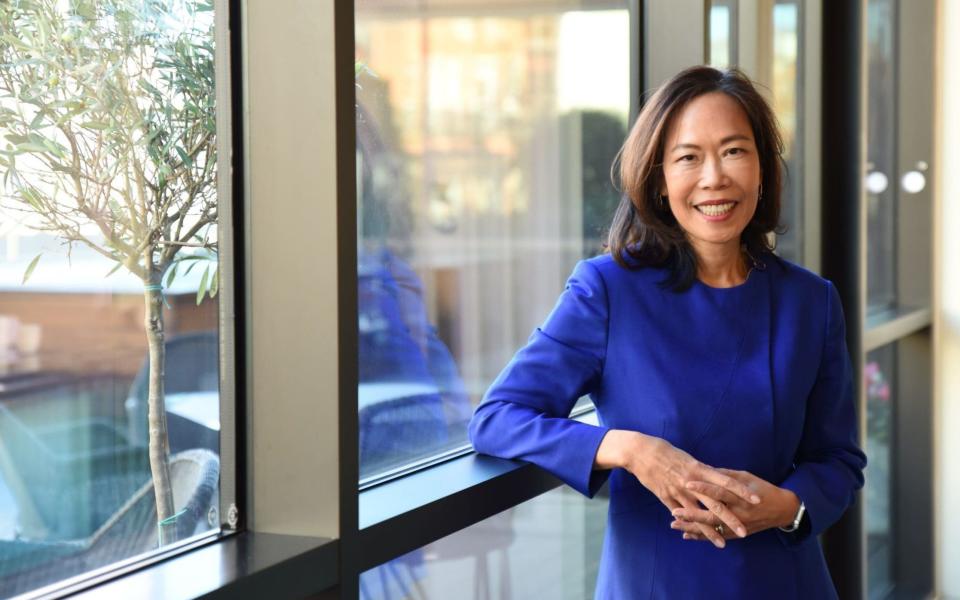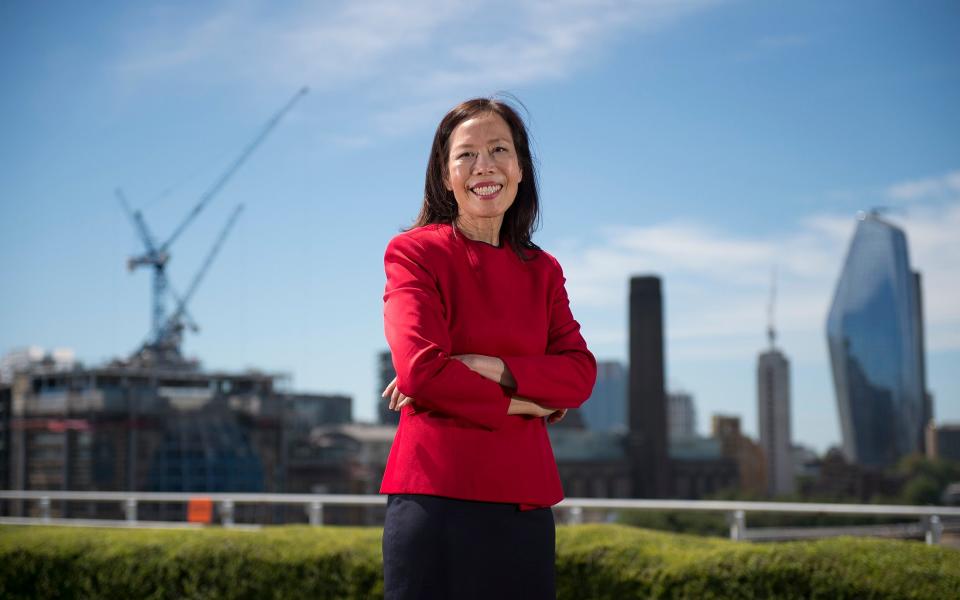IG Group boss June Felix: 'I believe in meritocracy – no one wants to be a token'

The Covid-19 pandemic might have laid waste to the global economy, but IG Group has done rather well out of the turmoil.
Business at the online trading platform has boomed while nearly 2,000 staff logged on from their homes around the world.
Employees were treated to a bumper £42m bonus round in April, net trading revenue from March to May more than doubled compared with the same period last year and the shares are up 30pc in the past 12 months.
For IG and rival spread betting firms such as CMC Markets and Plus500, wild swings in financial markets captured the imagination of investors and raised the prospect of big gains - and losses.
June Felix, IG’s boss since October 2018, has had a front row seat for the crisis that helped the firm’s pre-tax profits soar 52pc to £296m in the 12 months to May.
“It’s been really quite intense,” she says. “You’ve had quantitative easing, oil going negative. You know, I’m really proud of the fact that we were one of the few platforms that could price and trade when oil went negative. It’s been a series of tremors and shocks.”
As well as oil futures contracts briefly trading at below zero amid a global glut, the FTSE 100 fell about a third during the pandemic before mounting a recovery, the pound hit a 35-year low and UK bond yields went negative for the first time.
Felix, who worked in Hong Kong during the handover from the UK to China and near New York’s Twin Towers at the time of September 11, says IG had practised for major disruption.

One day a year, each office would shut entirely and everyone would work from home in case a building was rendered inoperable.
“That’s almost like a fire drill,” she says. “So when we had to do it, there was that knowledge and comfort, and there wasn’t the anxiety.”
That was just as well. In March, the FTSE 250 firm experienced three times its average trading volumes from the same month last year.
But its boss is already looking to the next challenge. Speaking from her London home, the former head of IBM’s banking and financial markets division says she wants to know what IG can learn from its pandemic response so it can handle the next crisis better.
Felix says she likes to have a plan. “I am outcome-focused. Where do I want to be and how do I work backwards [to see how to get there]? Organic chemistry was my favourite subject, which is very geeky and stupid, but it taught you to work backwards.”
Her science background as a chemical engineering graduate puts her in the minority among FTSE chief executives. So too does her ethnicity. Her father, an engineer, emigrated from China to the US, where he met her Chinese mother.
The Black Lives Matter protests in recent months have put racism and equality to the forefront of the political and business agenda. What should companies be doing to tackle the problem?
Felix sighs. ”It’s a long conversation but basically I believe in meritocracy.” Changing attitudes and assumptions is hard, she says. “Everybody has preconceived notions about individuals. As a Chinese woman, people thought [I] had to be meek and not speak up.”
Throughout her career, which has taken her from Deutsche Bank and Citigroup to payments firm Verifone, colleagues often seemed surprised when she spoke up and expressed a strong point of view, she says.
Moving past those prejudices takes time, Felix argues, comparing the process to physical training.
“Most people can’t just put on tennis shoes and do a marathon. You have to get used to thinking it’s normal to run at six o’clock in the morning.”

Being a woman places Felix in another minority among her peers. As of last November there were only 14 women in charge of FTSE 350 companies, according to the Hampton-Alexander Review.
More companies are adopting diversity targets to improve representation of women and people from minority groups in senior roles. Are targets, or even mandatory quotas, the way to improve equality?
“No one wants to be a token. In the past, it probably was helpful and it still can be used as a guide but nobody wants to be a token, so this is the conflict.
“You shouldn’t be promoting people that aren’t able to do the job,” she says, but adds there are other considerations that companies must factor in.
“If there are 10 things that [women] need to have in order to do the job, they’ll want to be perfect in all 10.”
What is that number for a man? “It’s less,” Felix volunteers diplomatically. “You ask any headhunter - they’ll tell you. If you change the name on the resumé from Hannah to Hank, it’s quite interesting.”
Improving gender balance among company bosses will require “concerted effort” on all sides, she says. Women need to “hang in there” and society must recognise the value of diverse leadership of organisations.
IG’s own employee base is 69pc male, matching Felix’s description of the firm’s typical client. “They’re 30 to 50 years old. They’re men. They are wealthy, they’re well educated. They’re astute in financial markets. They’re either in financial services or entrepreneurs or in technology.”
IG’s client base is growing but Felix is keen to break away from the spreadbetting industry’s image of catering to uninformed punters to focus on higher-end and professional clients.
Having served as a non-executive director at IG since 2015, she was brought in to steer the company through a regulatory crackdown in 2018 that upended the business model.
Alarmed at the big losses being run up by some customers, European and British regulators clamped down on spread betters, including through industry-wide restrictions on contracts for difference (CFDs), financial instruments that allow investors to bet on the price of a share, commodity or currency without owning the underlying asset.
Leveraged bets allow customers to take bigger positions, magnifying their gains or losses.
IG’s pre-tax profits fell 31pc for the financial year in which the changes were introduced.
“There were a lot of bad practices out there and it was appropriate for the regulators to make some effort to ensure that some of those practices were stopped,” admits Felix, hinting that regulators could also have done more to clamp down on some of IG’s rivals. “What they decided to do was really impact the category or the product as opposed to going after the individual players that participate in the category.”
The firm insists it has strict tests to ensure clients are wealthy enough and have sufficient understanding to use its products. The majority still lose money but Felix says that, unlike its rivals, IG doesn’t have a financial interest in its clients losing money. “We don’t profit from their losses. We’re execution-only.”
Felix’s strategy is to make IG a global player and diversify its product range so clients will invest more of their portfolios through IG.
New products include IG Prime, a brokerage service for institutional investors, while focusing on technology could allow the firm to achieve scale. Asked to describe IG’s business in three words, she says it is a “technology-enabled financial services company”.
The push to go global has meant tailoring its marketing for local audiences and even altering the look and feel of its app. Japanese customers want more detail from the investment app than those in the UK, for example.
As for the UK’s standing as a global financial hub, Felix believes it can retain that status post-Brexit provided there is political will to prioritise the sector.
“It’s really up to the leaders here in the UK to decide that it’s important enough for them to ensure that it remains as competitive and vibrant an environment as it’s always been.”
